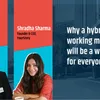Shifting Focus: Flexible workspaces help companies gather distributed teams
As employees hold on to the flexibility offered by Covid-19 induced work from home schedule, companies are exploring the hybrid work model to find a win-win situation.
Switching off the alarm for 7 am, stepping into the shower, usually skipping breakfast, then getting stuck in the traffic for an hour, only to reach the office for a 9-5 desk job. Sounds tiresome, right?
With Covid-19 giving several employees a taste for working from home, most companies can’t expect workers to automatically get back on the pre-Covid work schedule once offices resume.
Although the mass vaccination drive in the country has instilled confidence in some employees to go back to work, a section of employees might still hesitate to adopt the normal office routine.
To counter this hesitation, companies are steadily adopting the hybrid work model that gives freedom to employees to work from the office, home, or a co-working space.
In the current situation , when the idea of offices is no longer limited to a specific floor or building, companies are looking beyond designated workspaces and focusing on the larger aspects that make a ‘workspace’.
Here’s a look at some of these aspects:
GenNext: Reshaping the future of workspace
Most of the GenZs who started their careers in the lockdown may consider ‘work from home’ a corporate benefit as part of the current reality. But, with the implementation of a hybrid work model, GenZs can choose their preferred workspace where they can deliver their best.
Due to remote working, GenZs have become accustomed to working in a private space on a focused project for prolonged periods of time. The hybrid work model allows them to work in teams as well as alone, as required.
Considering that GenZ entered the workforce when the world of work was changing dramatically, these digital natives brought their strong grasp on digital technologies to develop a more fluid workspace, promote flexibility and remote collaborations.
Furthermore, the growing participation of GenZ in the gig economy (freelancing) during the lockdown is slowly disrupting the conventional notion of an office.
Building flexible workspaces
Through coworking spaces, employers are looking at a distributed workforce model to bring the team together safely. Since the hybrid work model focuses on increasing the productivity of employees through collaboration and shared work culture, flexible spaces become a place for strong community building, especially for the new-age generation which desires to work in an (informal) formal ? work environment.
Additionally, with the rise of the hub and spoke model across the country, employees, freelancers, among others. have the option to work in a coworking space nearest to their house, saving on an individual’s time and energy.
With organisations still bearing a significant burden on business, most corporate offices are exploring co-working spaces to provide the best-in-class office facilities and technology infrastructure to their employees to save operation costs..
The pandemic has given rise to various styles of working, and the hybrid work model presents the best side of both worlds to the employees, where they can work in pajamas and also experience office life.
As the world is grappling with the reality of a new work culture, organisations are creating setups that favor individual flexibility by considering hybrid work models, flexi spaces and needs and preferences of the employees. The delicate balancing act between different work models is what will define the future of work.
Edited by Affirunisa Kankudti
(Disclaimer: The views and opinions expressed in this article are those of the author and do not necessarily reflect the views of YourStory.)








